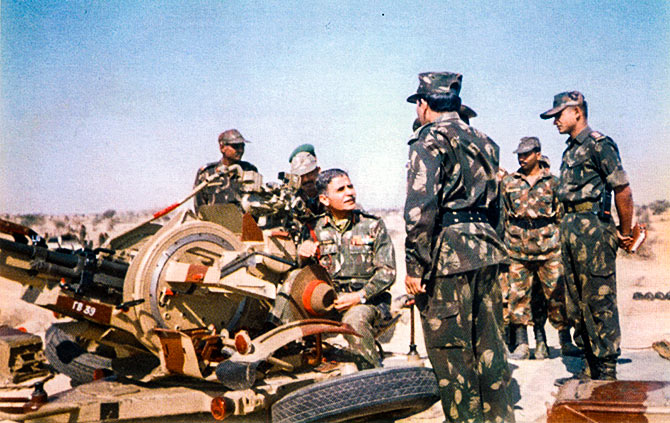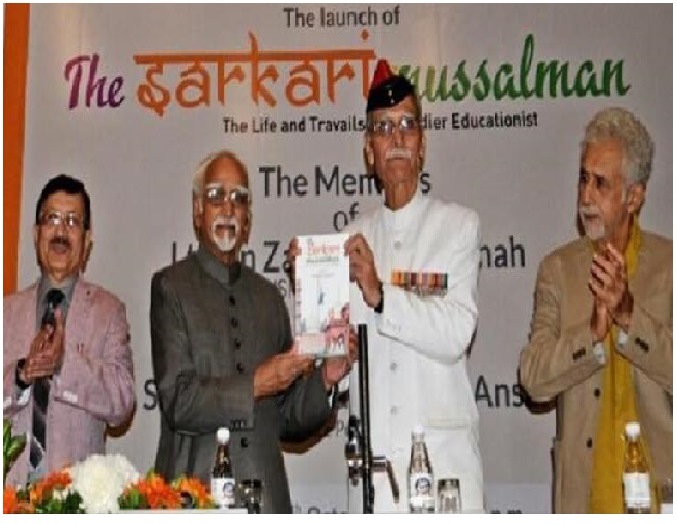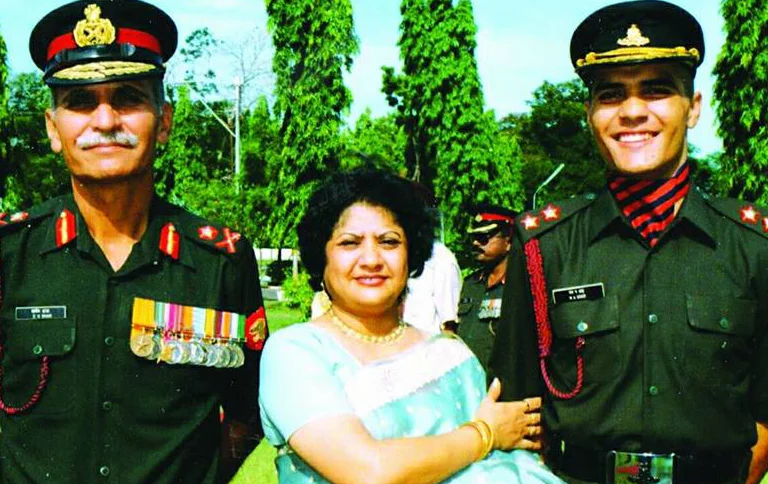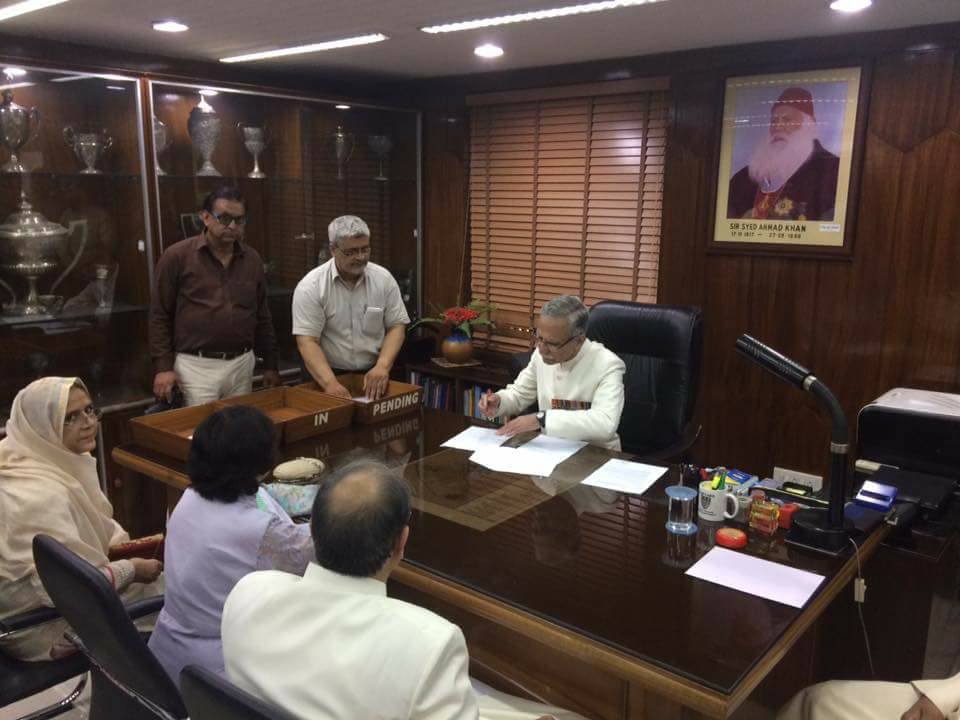Rita Farhat Mukand
Lt Gen Zameer Uddin Shah (Retd) maintains that the fist cannot be clinched in case of the slightest hurt to one of the fingers. Likewise, we, the humans, must know the importance of unity and teamwork. A Longewala veteran (1971 Indo-Pak war), who also spent years fighting insurgencies in the Northeast India has served for more than 40 years in the Army. Besides, he has worn five other hats: Diplomat (Saudi Arabia 1994-970, Peace Enforcer (Gujarat Riots 2002), Adjudicating Justice (Armed Forces Tribunal (2009-2012), Educationist (Vice Chancellor, AMU 2012 -2016) and author (The Sarkari Mussalman -2018).
He is from a line of Military families. His grandfather and other relatives served four years in France in WWI. Several uncles fought with the Punjab Regiment in Burma (Now Myanmar) in WW 2. His father was a ‘Refugee Officer’ with Gen Slim’s 14 Army in Imphal during the British-Japanese ‘Battle of The Admin Box’. He is the elder brother of celebrated Actor Naseeruddin Shah. Awaz-the Voice spoke to the Army Veteran in the run-up to the 77th Independence Day.
I asked him why he gave the title The Sarkari Mussalman to his book as it sounds odd for the autobiography of a Military Officer.
He said the government servants ‘who go by the rules’ are burdened with this sobriquet,by their community,when they do not pander to unreasonable requests. It implies a Government Stooge.

Lt Gen (Retd) Zameer Uddin Shah during 1971 War
On the Partition of India in 1947, The General said that his elder brother Zaheer was a pre-partition child; born in 1946 while he was born in 1948!
“I was born in Bahraich in Eastern Uttar Pradesh where my father was posted as Deputy Collector. I have written about the partition which was traumatic for my family as we were split. Members,who owed allegiance to the Muslim League,migrated to Pakistan. My grandfather who was an active member of the Congress decided to weather the storm in India, certain that they would get a fair deal. We were not mistaken,and never regretted our decision,until recently, when we were slighted as Ghuspetia (Intruders). Being addressed so derisively in the land of our birth was traumatic and grossly unfair. We serve our country;and have total faith in the Constitution and the inclusive nature of the bulk of our county men.
I asked him what are his memories of the 1971 Indo-Pak War abd he said:
“I fought the Battle of Longewala. My regiment consisted of Rajputs from Rajasthan, UP, and MP. There was a very interesting composition of 16 officers in the Regiment,2 Sikhs, 2 Muslims, 1 Christian, 1 Jew, and 10 Hindus. The Armed Forces represent the all-inclusive face of India. We trusted each other and fought shoulder-to-shoulder. An incident I remember vividly was that after an attack on a Pak post called ‘Islamgarh’, which the guns of my regiment battered and reduced to rubble, one Junior Commissioned Officer handed me a cloth-bound bundle and said, ‘Sir, this is for your safekeeping. I recovered it from The Islamgarh Mosque which had crumbled." It was a Quran. It is still with me and will be returned to its original and rightful place when conditions permit. This was the true spirit of the Indian Army.

Lt Gen (Retd.) Zameer Uddin Shah at the launch of his book The Sarkari Musalman
General (Later Field Marshal) Sam Manekshaw,addressed us just before the war in a short stirring speech. He had climbed onto a table, pushed away the mike, and with hands on hips, spoke briefly to about 300 officers of the Battle Axe Division. I will always remember his words ‘Boys! am sending you across, ensure victory. I want you to remember the following: Firstly, prisoners of war will not be ill-treated; secondly, there will be no booty taking /loot; thirdly, keep away from the Pakistani women.’ This is the sort of Generals we need in the Army; not verbose, but who speak sense.
The General dwelling on his theme said, "Let me also tell you that because Maneckshaw’s advice was accepted by the government of the day, India was saved from a mistimed offensive. The government of the day, under Prime Minister Indira Gandhi, was pressing to liberate East Pakistan (Bangladesh) as early as possible in 1971. Manekshaw advised against launching an offensive in summer, as the Indo-China passes would be open and the rivers would be in spate,with the approaching monsoon. He recommended an offensive in late Nov/Dec 1971.
"The PM, Mrs Indira Gandhi accepted his advice, a crucial factor in India’s victory. This is a lesson for all governments. Heed the advice of experienced soldiers. However, once a decision is takenit is the bounden duty of the soldiers to obey. We are veterans, and our hearts and loyalties lie in the profession we served for 40 years.It would be a mistake to shun our advice."

Lt Gen (Retd.) Zameer Uddin Shah with his wife and son
How has the Partition of India affected the Muslims?
I have never experienced the horror of the Partition, but my parents did. I have written about it in my book. ‘India’s Partition was another trauma my family faced. Those members who owed loyalty to the Muslim League migrated to Pakistan. My immediate family members who had full faith in the inclusive nature and large-heartedness of Indian society decided to brave it out in India. Our confidence was not misplaced,till recently. There were no riots in our hometown, Sardhana, largely because of the firm hold and authority of my Nana,(maternal grandfather). He threatened swift retribution to any community which indulged in violence. As a child, I did, however, hear horrific tales of the mayhem, arson, and murder during the Partition.
It affected but remained bottled up inside me. I could only drive out the ghost from my system after I joined the National Defence Academy Khadakwasla, Pune. In this great institution, I was warmly welcomed, treated fairly, and experienced affirmative action, being the lone Muslim in my course of about 200 cadets. My wife and I took care to never talk about the horrors of the Partition to our children. It is a closed and forgotten chapter. My parents experienced it first hand, and I heard about it. Luckily my children didn’t, bt it took three generations to forget.
Whenever there is a riot, we expect the political leaders to order ‘Stop this nonsense’. Their silence means tacit approval. Our political leaders must have the courage and gumption to speak up and condemn any atrocity.
The social and electronic media, too, are whipping up communal passions. The Government must take strict action against the divisive activities.

Lt Gen (Retd.) Zameer Uddin Shah as VC, AMU
Please share some thoughts about the Inclusive character of the Army.
The Army has the greates tculture of unity. I was the lone Muslim of the 200 cadets in NDA and nobody ever bothered about my beliefs. The Army is a great organization; our religion was the uniform we wore. We followed the customs of the men. There are Mandir and Masjid parades,in which all ranks, irrespective of caste and religion, participate, exhibiting solidarity and unity.
In the Army, if there are more than 110 troops in a particular unit, for example, the Jammu and Kashmir Light Infantry wherethere are Muslims, Sikhs, and Hindus, there is a common place of worship, in one hall. This is the strength of the Army, absolutely secular. Religion is a person’s private business. When one is in uniform, it becomes that person’s religion. This makes the Army a neutral force, especially when quelling riots. I was ordered to quell the Gujarat Riots in 2002. The riots were out of the control of the partisan police force. The Army quelled the Gujarat Riots within 24 hours because of strong, firm, and nonpartisan action. I cannot blame the police, they live in an environment where they get affected. Not so the Army. It is deployed, does its job, and then moves out.
ALSO READ: Haji of Turangzai: Forgotten revolutionary whose campaign inspired Frontier Gandhi
Independence Day is approaching and as an Army veteran what is your vision of India?
We can become a world power if we remain united. Stop othering a particular community. We were born and will die here. It is our motherland. Stop this torrent of hate that is seeping in and destroying the social cohesion of our country. The five fingers of a hand need to remain clenched in a powerful fist.
Rita Farhat Mukand is an independent writer and author.
